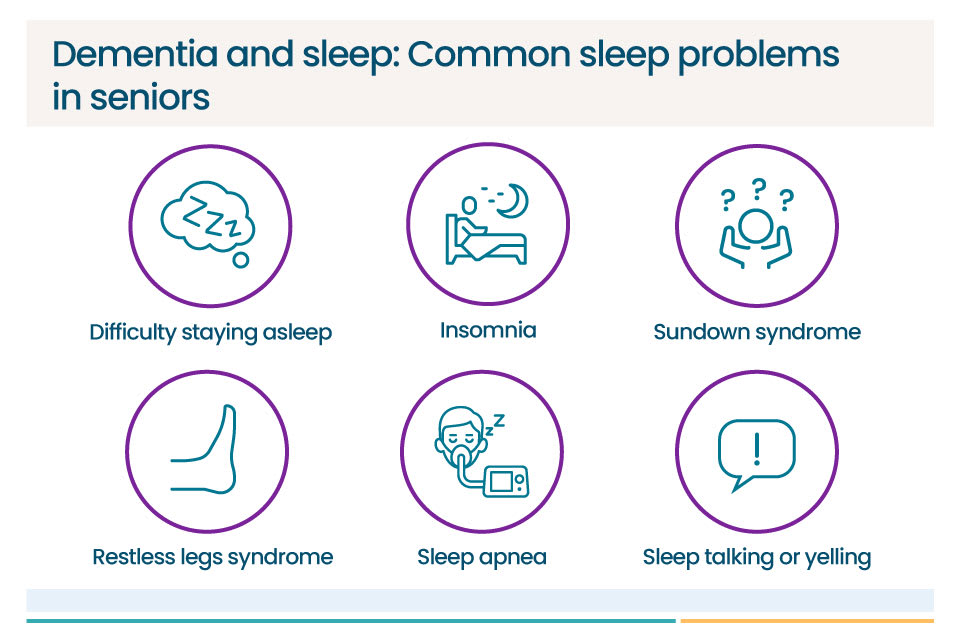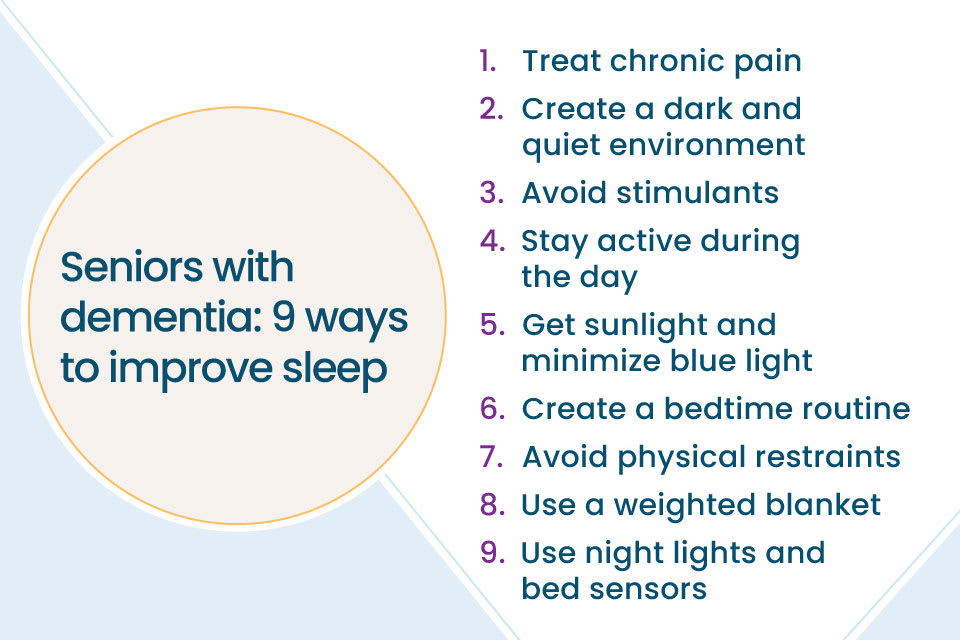
Dementia and Sleep: How to Manage and Treat Sleep Problems

When your loved one with Alzheimer’s disease or another form of dementia doesn’t sleep well, you probably don’t get enough sleep either. That’s exactly why the connection between dementia and sleep is a common source of stress for family caregivers of dementia patients. Continue reading to get a better understanding of the causes of sleep problems in dementia patients and learn how you can help your loved one develop a healthy sleep routine.
Let our care assessment guide you
Our free tool provides options, advice, and next steps based on your unique situation.
Key Takeaways
- Sleep disturbances are common in dementia patients. Up to 50% of dementia patients experience sleep disturbances.
- Dementia can affect sleep in many ways. Patients may experience insomnia, excessive daytime sleepiness, sundown syndrome, REM problems, and more.
- Sleep problems can be managed with lifestyle changes. Caregivers can encourage physical activity, create a calming bedtime routine, and talk to a doctor about potential causes.
- Consider memory care. If your loved one’s sleep issues are becoming difficult to manage, you may want to consider memory care options, where they’ll receive 24-hour specialized care.
Common sleep problems in elderly people with dementia

Older adults’ total sleep time decreases by almost 30 minutes per decade starting in middle age.[03] And, sleep problems are even more common in people with dementia due to the condition’s impact on the brain. In fact, studies estimate that about 25% to 50% of adults with dementia experience sleep disturbances.[04] The type and severity of sleep disturbances may vary depending on your loved one’s dementia type and the stage of their dementia.
A dementia patient who is not sleeping through the night may be experiencing the following sleep problems [05]:
- Difficulty staying or falling asleep. This can be caused by changes in the brain, aging, problems with the sleep cycle, side effects of medication, or other factors.[4]
- Insomnia. Insomnia and dementia have been linked due to dementia-related effects, medications, and behavior and mood disturbances. Insomnia occurs in 25% to 33% of dementia patients people with dementia.[5]
- Sundown syndrome. This syndrome refers to increased confusion, agitation, anxiety, and aggression in dementia patients at night or in the early evening.
- Problems with movement during sleep. Individuals with dementia may experience restless legs syndrome, which causes an uncomfortable urge to move the legs during periods of rest, or rapid eye movement (REM) sleep behavior disorder, which makes people act out their dreams.
- Sleep talking or yelling. Dementia patients may talk in their sleep or yell at night. It’s commonly seen in certain types of dementia — especially Lewy body dementia (DLB LBD) and vascular dementia.[7] Dementia patients talking When people with dementia begin to talk in their sleep, it may indicate a REM sleep disorder or another health condition. in their sleep may indicate a REM sleep disorder or another health condition.
- Sleep-related breathing disorders. Alzheimer’s disease patients are at a higher risk for sleep breathing disorders, specifically sleep apnea as it affects about 50% of people with Alzheimer’s.[6]
What causes excessive daytime sleepiness?
Some people with dementia sleep excessively during the daytime. They may feel like they can’t stay awake, and they may take long naps that interfere with nighttime sleep and overall quality of life. Excessive daytime sleepiness (EDS) is more common in people with Parkinson’s disease dementia or Lewy body dementia than in those with Alzheimer’s disease.[08]
Some factors that may contribute to excessive daytime sleepiness in a person with dementia include the following [09]:
- Insufficient sleep at night
- Sedating medications
- Damage to brain cells caused by dementia
- Changes in sleep patterns caused by dementia
- Mental health conditions, such as depression
- Other sleep disorders, such as sleep apnea
Should you let a dementia patient sleep whenever they want?
In short, no. Dementia patients should maintain a healthy sleep schedule for optimal rest. Long naps, especially later in the afternoon, can disrupt your loved one’s sleep-wake cycle, doing more harm than good.[01] That said, an occasional catnap may be necessary in times of extreme exhaustion, so use your best judgment when allowing sleep routine changes.
Read related article:https://www.aplaceformom.com/caregiver-resources/articles/dementia-patients-sleeping-a-lot

Let our care assessment guide you
Our free tool provides options, advice, and next steps based on your unique situation.
Causes of sleep problems in dementia patients
Researchers and doctors don’t understand exactly why people with dementia don’t sleep properly, but they do know that dementia-related brain changes seem to affect the body’s circadian rhythm. The circadian rhythm regulates a person’s sleep-wake cycle and helps support important physical, mental, and behavioral processes across a 24-hour period.
Here are some factors that can offset a person with dementia’s circadian rhythm, leading to poor sleep [10]:
- Little exposure to sunlight during the day, especially in the morning
- Inactivity during the day
- Mental or physical exhaustion and stress at night
- Chronic pain
- A poor sleep environment, such as a noisy or bright room
- Medication side effects
- Diet, such as excessive caffeine, sugar, or alcohol
- Dementia-related confusion
Sleep problems in people with dementia often have multiple causes. Talk to a doctor about your loved one’s specific symptoms. The doctor may have questions about your parent’s sleep habits, medications, diet, and any other health conditions. These details can help a doctor to diagnose what’s disrupting your loved one’s sleep.
How to get dementia patients to sleep at night: 9 tips for better sleep

1. Treat pain and other medical conditions. Getting to the root cause of chronic pain may help improve your loved one’s sleep. If a condition like sleep apnea is the problem, consult with their doctor for solutions. If restless legs syndrome is disturbing your parent’s sleep, a magnesium supplement may help.[12] Be sure to check with your loved one’s doctor or pharmacist before introducing any new supplements.
2. Create a soothing environment. Make sure your loved one’s room is set up to promote good sleep. The room should be dark, quiet, and cool. Set the temperature between 60 and 67 degrees Fahrenheit, and consider using a white-noise machine to minimize external noises and agitation.[13]
3. Check for medication side effects and avoid stimulants. Many people with dementia take several medications. Some of these drugs, such as stimulants or diuretics, can interfere with sleep. In fact, stimulants like caffeine, alcohol, sugar, and nicotine are known for disrupting sleep.[14]
In some cases, it’s also possible to switch medications or change the time of day a certain drug is given to help improve sleep. Be sure to check with a doctor before making any changes to your loved one’s medication regimen.
4. Encourage activity during the day. Help your loved one stay physically, socially, and mentally active throughout the day. For example, you can start mornings with a walk, have a friend over for lunch, and do a mind-stimulating activity like reading or listening to music in the afternoon. Remember, every day doesn’t need to be filled with multiple activities, so be sure to spread them out to minimize exhaustion and confusion.
5. Get some sunlight and minimize blue light. Get outside or into bright lights soon after waking up in the morning to help regulate the sleep cycle. Using a bright light therapy lamp in the morning has been shown to improve rest and sleep efficiency in dementia patients.[15] Additionally, practice dimming the lights and minimizing blue light exposure in the evening to help your loved one wind down.
6. Establish a sleep schedule and routine. Try to get your loved one to go to bed at the same time each night and limit daytime naps. Creating a calming bedtime routine may also help. For example, you may dim the lights, play soothing music, make some chamomile tea, and use aromatherapy to promote sleep before bedtime.
7. Don’t use physical restraints. You may consider using restraints to prevent nighttime wandering. This may instead cause frustration and agitation, leading to more sleep disturbances. Instead, consider a speaker with a motion detector that will calmly tell a loved one with dementia it’s time to go back to bed.
8. Try a weighted blanket. Recent research has shown promising results with weighted blankets for seniors and seniors with dementia alike. Seniors reported falling asleep faster and remaining asleep, while their caregivers noted they had more energy and less anxiety during the day. A weighted blanket should equal about 10% of a senior’s weight to provide a calming effect.[16]
9. Use nightlights and bed sensors. Nightlights in hallways and bathrooms can help prevent nighttime confusion or accidents if your loved one gets up in the night to walk around. A bed alarm or bed sensor can also alert caregivers of nighttime wandering, so they can guide their loved one back to bed. However, be sure to choose one that doesn’t make loud or alarming noises around the person with dementia, as this can cause agitation that leads to falls.

Talk with a Senior Living Advisor
Our advisors help 300,000 families each year find the right senior care for their loved ones.
Sleep aids for dementia patients: Medications, supplements, and more
In some cases, a doctor may prescribe medications to help your loved one sleep. However, older adults with dementia are more likely to experience the negative side effects of sleep-inducing drugs, so long-term use is not recommended. In fact, over-the-counter as well as prescribed sleep medications have been significantly linked to an increased risk of dementia worsening, falls, confusion, and a decline in the ability to care for oneself.[11][17]
Doctors often prescribe medications based on the behaviors that accompany the sleep changes and it’s often an antipsychotic drug. However, this decision should be considered with extreme caution because anti-psychotic medications have been linked to an increased risk of stroke and death in older adults with dementia.[11]
What is the best sleep aid for dementia patients?
There is no one best sleep aid for seniors with dementia. However, some studies show that melatonin supplements may improve sleep in older adults with dementia when combined with bright light therapy.[18] Bright light therapy uses outdoor daylight or an indoor artificial light source to regulate the circadian rhythm, which in turn reduces the effects of dementia-related sleep disturbances.
However, melatonin is only recommended when other non-drug, behavioral therapies have failed.[19] Though it is over-the-counter, melatonin is still a powerful hormone and it can lead to dependence. You may also consider using herbal remedies before opting for hormones like melatonin. Herbs like valerian root, kava, and chamomile have been used for centuries to promote healthy sleep and are available in your local health food store.[20] Always check with your doctor or pharmacist before starting any over-the-counter sleep aids or sleeping pills for dementia patients.
Additional support and options
As dementia progresses, sleep problems along with other difficult dementia symptoms can get worse to a point where lifestyle changes may no longer help. This may be a good time to evaluate whether you need additional caregiver support to help ensure your loved one’s health, well-being, and safety. Consult A Place for Mom’s signs it’s time for memory care list.
It’s also important to prioritize your own health and rest, which often means sharing caregiving responsibilities with another family member or a professional, in-home caregiver. Consider looking into respite care or home care options. These options give you a much-needed break while providing your loved one with the attentive care they need.
On the other hand, if it’s becoming difficult to manage your elderly loved one’s sleep issues and dementia symptoms at home, it may be time to explore memory care. Memory care communities provide 24-hour specialized care services, with comforting design features and technologies as well as qualified caregivers to meet your loved one’s unique needs.
If you need help starting your search, reach out to a Senior Living Advisor at A Place for Mom. They’ll help you navigate senior living or home care solutions based on your loved one’s location, needs, and preferences — all at no cost to you.
Alzheimer’s Society. (2021, March 2). How does dementia affect sleep?
Fry, A. & Rehman, A. (2022, April 21). Alzheimer’s disease and sleep. Sleep Foundation.
Stepnowsky, C. J., Jr. & Israel-Ancoli, S. (2009, January 1). Sleep and its disorders in seniors. Sleep Medicine Clinics.
Rose, K. M., Fagin, C. M., & Lorenz, R. (2010, May 6). Sleep disturbances in dementia: What they are and what to do. Journal of Gerontological Nursing.
Molano, J. & Vaughn, B. V. (2014, February). Approach to insomnia in patients with dementia. Neurology Clinical Practice.
Andrade, A., Bubu, O. M., Varga, A. W., & Osorio, R. S. (2018, June 12). The relationship between obstructive sleep apnea and Alzheimer’s disease. Journal of Alzheimer’s Disease.
Honda, K., Hashimoto, M., Yatabe, Y., Kaneda, K., Yuki, S., Ogawa, Y., Matsuzaki, S., Tsuyuguchi, A., Tanaka, H., Kashiwagi, H., Hasegawa, N., Ishikawa, T., & Ikeda, M. (2013, February 21). The usefulness of monitoring sleep talking for the diagnosis of dementia with Lewy bodies. International Psychogeriatrics.
Shen, Y., Huang, J., Li, J., & Liu, C. (2018, April 20). Excessive daytime sleepiness in Parkinson’s disease: Clinical implications and management. Chinese Medical Journal.
Boeve, A., Ferman, T. J., Aakre, J., St. Louis, E., Silber, M., Machulda, M., Fields, J., Graff-Radford, N., Mielke, M., Geda, Y., Jones, D., Graff-Radford, J., Knopman, D., Petersen, R., & Boeve, B. (2019, February 10). Excessive daytime sleepiness in major dementia syndromes. American Journal of Alzheimer’s Disease & Other Dementias.
Alzheimer’s Association. Sleep issues and sundowning.
Alzheimer’s Association. Treatments for sleep changes.
Summer, J. & Wright, H. (2022, July 6). How magnesium can help you sleep. Sleep Foundation.
Lin, L., Weng, S., Wu, H., Tsai, L., Lin, Y., & Yeh, S. (2018, February). The effects of white noise on agitated behaviors, mental status, and activities of daily living in older adults with dementia. Journal of Nursing Research.
Sleep Health Foundation. (2020, June 23). Caffeine, food, alcohol, smoking, and sleep.
Hanford, N. & Figuiero, M. (2013, January 1). Light therapy and Alzheimer’s disease and related dementia: Past, present, and future. Journal of Alzheimer’s Disease.
Telhede, E. H., Arvidsson, S., & Karlsson, S. (2021, December 14). Nursing staff’s experiences of how weighted blankets influence resident’s in nursing homes expressions of health. International Journal of Qualitative Studies in Health and Well-being.
Robbins, R., DiClemente, R. J., Troxel, A. B., Jean-Louis, G., Butler, M., Rapoport, D. M., & Czeisler, C. A. (2022, March 1). Sleep medication use and incident dementia in a nationally representative sample of older adults in the US. Sleep Medicine.
Riemersma-can der Lek, R. F., Swaab, D. F., Twisk, J., Hol, E. M., Hoogendijk, W. J. G., & Van Someren, E. J. W. (2008, June 11). Effect of bright light and melatonin on cognitive and noncognitive function in elderly residents of group care facilities: A randomized controlled trial. The Journal of American Medical Association.
Papillon-Ferland, L. (2018, August 31). Should melatonin be used as a sleeping aid for elderly people?The Canadian Journal of Hospital Pharmacy.
Suni, E. & Rehman, A. (2022, September 1). Natural sleep aids. Sleep Foundation.
Senior living options in all states
The information contained on this page is for informational purposes only and is not intended to constitute medical, legal or financial advice or create a professional relationship between A Place for Mom and the reader. Always seek the advice of your health care provider, attorney or financial advisor with respect to any particular matter, and do not act or refrain from acting on the basis of anything you have read on this site. Links to third-party websites are only for the convenience of the reader; A Place for Mom does not endorse the contents of the third-party sites.
Make the best senior care decision
Make the best senior care decision